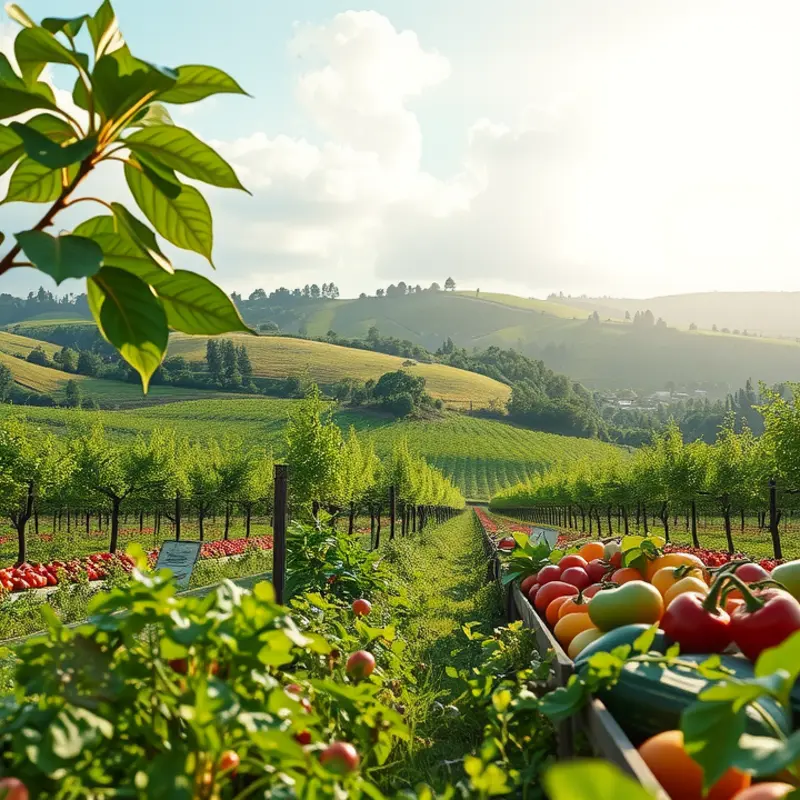Sustainable diet planning is essential for environmentally-conscious individuals eager to make food choices that align with their values. An eco-friendly approach to eating not only benefits personal health but also nurtures the planet. With growing concerns about climate change and resource depletion, adopting sustainable eating practices has never been more crucial. This guide provides practical strategies and insights to help you create a diet plan that is both nutritious and good for the environment.
Embrace Plant-Based Eating

Shifting towards a plant-based diet can significantly improve your carbon footprint while also enhancing your well-being. By reducing reliance on animal products, you contribute to lower greenhouse gas emissions. Livestock farming, a major contributor to methane emissions, demands vast resources like land and water. Embracing a plant-based lifestyle offers a more sustainable approach.
Health Benefits
Plant-based diets are rich in nutrients. Whole grains, legumes, fruits, and vegetables provide ample fiber, vitamins, and minerals. This nutrition profile supports better digestion, reduced inflammation, and improved heart health. Evidence suggests that plant-based eating can lower the risk of chronic diseases, such as diabetes and hypertension. Moreover, with lower saturated fat intake, you also support healthy weight management.
Practical Tips
Transitioning doesn’t require overnight changes. Begin by identifying familiar meals that can be easily altered. For instance, swap meat in your tacos with black beans or mushrooms. Incorporating plant-based protein sources like tofu, tempeh, or lentils can be satisfying and versatile. Embrace the adventure of trying diverse cuisines; Indian, Mediterranean, and Asian dishes often highlight plant-based options.
Stock your pantry with staples like nuts, seeds, and legumes. These act as nutritious bases for a multitude of meals. Planning ahead is crucial. Explore reduced-waste meal prep tips to maintain fresh ingredients and reduce waste.
Delicious Plant-Based Meal Ideas
Kickstart your day with a hearty oatmeal topped with fruits and nuts. For lunch, a chickpea salad with kale and quinoa delivers flavor and sustenance. Dinner can feature a vegetable stir-fry or a spicy lentil curry. Depending on local produce, adapt your meals to be both budget-friendly and flavorful.
Importance of Local and Seasonal Produce
Utilizing local and seasonal produce minimizes the carbon footprint associated with transporting goods across long distances. Seasonal foods are fresher, more flavorful, and often more affordable. Their nutritional value is usually at peak levels, providing maximum benefits. Farmers’ markets are excellent venues for sourcing local and organic produce, thereby supporting regional economies as well.
Creative Ingredient Incorporation
Variety is key to maintaining excitement and nourishment in a plant-based diet. Explore ancient grains like farro, teff, or amaranth. Experimenting with herbs and spices can elevate flavors without adding salt, which is crucial for reducing sodium intake. For more on enhancing dishes without salt, check out these flavor boosters.
Incorporating a range of plants in your diet not only benefits your health but also revitalizes your relationship with food. Curating meals from fresh, vibrant ingredients allows you to savor each bite. This change fosters mindfulness about what we consume, reconnecting us to nature with each meal. Ultimately, embracing a plant-based lifestyle is a step towards sustainable living, cherishing the planet and our well-being.
Reduce Food Waste and Support Local Farmers

Reducing food waste is a crucial step toward sustainable living. It not only helps in conserving resources but also minimizes the carbon footprint associated with food disposal. One effective strategy is meal planning. By planning meals in advance, you ensure that ingredients are used efficiently, reducing the likelihood of spoilage. This doesn’t just mean listing your meals—consider the quantities needed for each ingredient. Creating a detailed shopping list based on a meal plan reduces impulse buys that could lead to waste.
Another imperative aspect is the proper storage of food items. For details on effective storage practices that can prolong food freshness, see the eco-smart kitchen storage guide. Learn which items are best stored in the fridge, which need a cool pantry, and how to preserve the quality of fresh produce.
Supporting local farmers is another way to make your diet more eco-friendly. Purchasing seasonal produce from local markets lessens the environmental impact caused by long-distance food transportation. By sticking to what’s in season, you reduce reliance on energy-intensive farming techniques often used for out-of-season produce. Buying directly from farmers means fresher produce, which tends to last longer, and helps sustain local economies.
When it comes to leftovers, creativity is key. Rather than discarding them, transform these ingredients into new meals. Leftover vegetables, for example, can be incorporated into frittatas or stir-fries. Stale bread can be revived as croutons or bread pudding. Embracing such creative cooking methods not only inspires culinary innovation but significantly cuts down on waste.
Moreover, it’s essential to understand your habits related to food disposal. Identify why waste occurs in your household. Is it due to cooking excess amounts? Frequently forgotten items in the fridge? Address these causes by adjusting portions or setting reminders to consume perishable foods.
Ultimately, the goal is to treat food as a precious resource. By doing so, you contribute to a more sustainable food system. Through thoughtful meal planning, proper storage, support of local farmers, and inventive use of leftovers, you can make a notable impact on reducing food waste and supporting the planet’s health.
Final words
Adopting a sustainable diet is not merely a trend; it’s a lifestyle choice that resonates with the urgent need for environmental consciousness. By transitioning to plant-based meals, minimizing food waste, and supporting local farmers, you empower yourself while nurturing the planet. Remember, every small step counts, and collectively, these efforts can lead to significant positive change. Implement these strategies gradually and share your journey with like-minded individuals to inspire others. Together, let’s cultivate a healthier future for ourselves and our planet.








